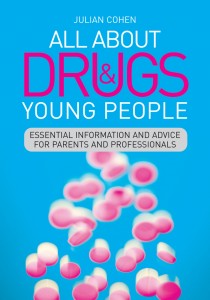Julian Cohen, author of All About Drugs and Young People, is a writer, educator, counsellor and consultant who has specialised in drug and sex education work with children, young people, parents, carers and professionals for nearly 30 years. In this blog post he covers tips and advice for adoptive parents who may be concerned about their child and drugs, and there is a free extract from the book for you to read at the end of the post.
National Adoption Week is highlighting the fact that over 4,000 children in England are waiting for adoptive parents. A significant number of these children are older, have had particularly distressing childhood experiences and have additional and complex needs. They need adoptive parents who will help them overcome their troubled backgrounds. This means consistently sticking by them through the good times and the bad, helping them to make sense of who they are and to grow up feeling safe and secure.
These children may use a range of drugs not just to have fun but in an attempt to escape from unpleasant feelings they have about themselves, past experiences and anxieties about their futures.
Adoptive parents need to be drug aware and sensitive and relaxed about how they deal with young people’s involvement with drugs. How can they go about doing this? Here are 10 suggestions to help you be prepared.
1. Be aware that we are all drug users and have a lifetime drug career. If we think of drugs as mood altering substances they include alcohol, tobacco, caffeine and medicines, as well as illegal drugs, ‘legal highs’ and other socially taboo substances such as solvents. We all self- medicate throughout our lives. The key is to promote a relatively healthy and safe drug career, rather than a damaging one. 
2. Be informed – learn about drugs and their use. You don’t need an encyclopedic knowledge but you do need to know something about various drugs, the different ways they are used, possible effects and dangers. At the same time you need to avoid the many myths that often surround discussion of drugs. Read books, look on the internet and talk to other adults and to young people.
3. Be aware of your own use of drugs, both past and current, and your particular feelings about drug use. What messages is your use giving your child, why do you feel as you do and how do your views compare with and other adults you know and with young people?
4. Be realistic. Be clear about what you can expect of children of a particular age, development and background. Drug use can be dangerous but avoid exaggerating the risks. Going over the top about dangers is a sure way of closing down communication with young people. And don’t think that they always will be deterred by risky behaviours. Risk can be attractive to them. Rather than expecting they will never use drugs adopt a harm reduction approach where you can have an honest dialogue with them about what they are up to and help to ensure their safety.
5. Talk with young people and make drug use a normal topic of conversation. Use opportunities that arise from watching TV and films. Don’t rush in and tell them what to feel, think or do. Take it gently and listen to what they have to say. You may sometimes need to bite your tongue and agree to disagree.
6. Know how to assess the risks involved with young people using drugs. Take into account the particular drug they may be using, how much and how often, how they are feeling in themslef and also who they may be using with, when and where. Don’t assume the worst and be aware that heavy, regular drug use is often motivated by a desire to blank out painful emotions.
7. Negotiate sensible, age appropriate drug rules. Rather than impose rules discuss with young people what they think might be best. Start with alcohol, cigarettes, caffeine and medicines. If, what, how much and often, when, where and who with can be discussed. You can consider sanctions for breaking the rules and might also put the spotlight on your own drug use as well as theirs.
8. Educate young people about drugs. Learn together by talking and looking at drug pamphlets, books and the internet. Include learning about basic first aid so they can help other people in any emergency situations. Support their school to deliver relevant drug education.
9. Respond to situations where young people become involved with drugs without panicking, being aggressive or overly draconian. Rather than rushing to act, whenever possible create time to think carefully and find out more before responding.
10. Know where to get help, if needed. The Frank website – www.talktofrank.com – can point you to local drug services that offer information, advice and support for young people and for yourself. They also have a telephone helpline on 0300 123 6600. If you need help or advice also consider talking to your local adoption support groups and workers, other adoptive parents and your family and friends.
Remember, most young people who use drugs, including illegal and other socially taboo substances, do so without getting into serious problems. And many of those who do have problems with drugs will, in time, grow out of it. Supportive parenting can make a huge and positive difference to young people’s drug careers and their lives.
Julian Cohen
Read a free extract from Julian’s book here.
Find out more in Julian’s book All About Drugs & Young People – Essential Information and Advice for Parents and Professionals. Julian can also be contacted via his website www.juliancohen.org.uk